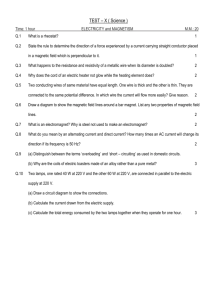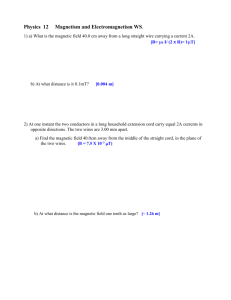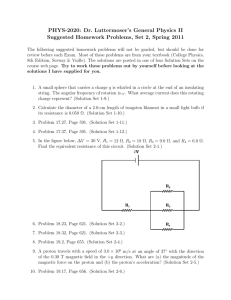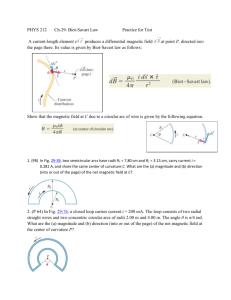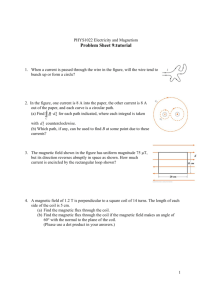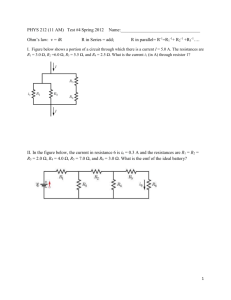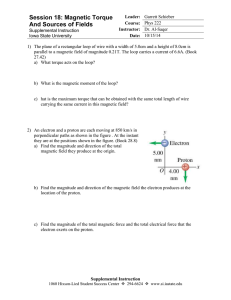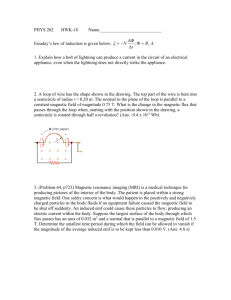exam2_solutions
advertisement
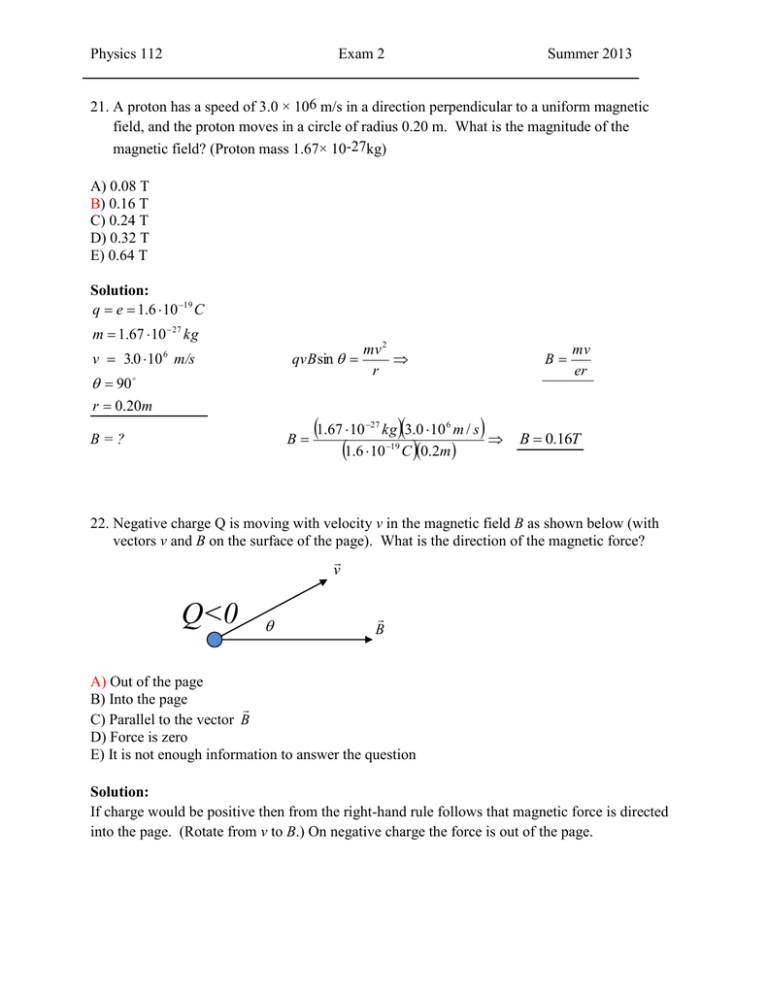
Physics 112 Exam 2 Summer 2013 21. A proton has a speed of 3.0 × 106 m/s in a direction perpendicular to a uniform magnetic field, and the proton moves in a circle of radius 0.20 m. What is the magnitude of the magnetic field? (Proton mass 1.67× 10-27kg) A) 0.08 T B) 0.16 T C) 0.24 T D) 0.32 T E) 0.64 T Solution: q e 1.6 10 19 C m 1.67 10 27 kg qvB sin v 3.0 10 6 m/s 90 r 0.20m B B=? mv 2 r B 1.67 10 kg3.0 10 m / s 1.6 10 C 0.2m 27 6 19 mv er B 0.16T 22. Negative charge Q is moving with velocity v in the magnetic field B as shown below (with vectors v and B on the surface of the page). What is the direction of the magnetic force? v Q<0 B A) Out of the page B) Into the page C) Parallel to the vector B D) Force is zero E) It is not enough information to answer the question Solution: If charge would be positive then from the right-hand rule follows that magnetic force is directed into the page. (Rotate from v to B.) On negative charge the force is out of the page. Physics 112 Exam 2 Summer 2013 23. An electric field of 1.60 kV/m and magnetic field of 0.400 T act on a moving electron to produce no net force. Calculate the minimum speed of the electron. A) 2.0 10 3 m / s B) 3.0 10 3 m / s C) 4.0 103 m / s D) 5.0 10 3 m / s E) 6.0 10 3 m / s Solution: E 1.60kV / m F qE qv B 0 B 0.400T v ? v min E 1.60 10 3 V / m 4.0 10 3 m / s B 0.400T 24. The force on a current-carrying wire in a magnetic field is the strongest when A) The current is parallel to the field lines B) The current is at a 30° angle with respect to the field lines C) The current is at a 45° angle with respect to the field lines D) The current is at a 60° angle with respect to the field lines E) The current is perpendicular to the field lines Solution: F IlB sin For 90 : F Fmax . 25. A 1.5-m length of wire carrying 4.5 A of current is oriented horizontally. At that point on the Earth’s surface, the dip angle of the Earth’s magnetic field makes an angle of 38° to the wire. Estimate the magnitude of the magnetic force on the wire due to the Earth’s magnetic field of 5.5 105 T at this point. A) 1.2 10 4 N B) 2.3 10 4 N C) 3.4 10 4 N D) 4.5 10 4 N E) 1.2 10 5 N Solution: The dip angle is the angle between the Earth’s magnetic field and the current in the wire. Use Eq. 20-1 to calculate the force F IlB sin 4.5 A 1.5 m 5.5 105 T sin 38o 2.3 104 N Physics 112 Exam 2 Summer 2013 26. A current-caring circular coil is in uniform magnetic field. The maximum magnitude of the torque on the coil occurs when the angle between the field and magnetic moment is A) 0 B) 45 C) 90 D) 135 E) 180 Solution: MB sin max 90 27. Two long parallel wires are 4.0 cm apart. Each wire carries the current 10 A in the same direction. Find the magnetic field halfway between the wires. A) B) C) D) E) 1 10 4 T 2 10 4 T 3 10 4 T 4 10 4 T zero I I r B1 B2 B B1 B2 0 Solution: B1 r B2 28. Two long parallel wires carry currents of 20 A and 5.0 A in opposite directions. The wires are separated by 0.20 m. At what point between the two wires are the contributions to the magnetic field equal? A) 0.040 m from the 20 A wire B) 0.080 m from the 20 A wire C) 0.12 m from the 20 A wire D) 0.16 m from the 20 A wire E) 0.18 m from the 20 A wire Solution: I B 0 2r 0 I1 0 I 2 2x 2 d x I1 I 2 x dx 20 A 5A x 0.16m x 0.20m x Physics 112 Exam 2 Summer 2013 29. The magnetic field inside an air filled solenoid is B. The cross-sectional area of the solenoid is doubled, keeping the current flowing through the solenoid and the number of turns per unit length unchanged. What happened with the magnetic field inside solenoid? A) B) C) D) E) Remains the same Doubles Quadruples Halves Devides by 4 Solution: Magnetic field inside solenoid is independent from the cross-sectional area of the solenoid. 30. A bar magnet falls through a loop of wire with the north pole entering first. As the north pole enters the wire, the induced current will be (as viewed from above) A) B) C) D) E) Zero Clockwise Counterclockwise To top of loop A current whose direction cannot be determined from the information given Solution: According to the Lenz’s law the induced current creates magnetic field that opposes the original change in the flax. As the north pole of the falling magnet enters the wire the down directed flux is increasing. The induced counterclockwise current creates magnetic field directed up. v S N I B Physics 112 Exam 2 Summer 2013 31. A stationary loop of wire is placed in a magnetic field directed into the page as shown below. The current in the loop of wire is: x x x x x x x x x x x x x x x x x x x x x x x x x x x x x x x x x x x x A) B) C) D) E) Clockwise if the magnitude of the magnetic field is decreasing Clockwise if the magnitude of the magnetic field is increasing Clockwise if the magnitude of the magnetic field is increasing or decreasing Counterclockwise if the magnitude of the magnetic field is increasing or decreasing No current will flow through the loop if the magnetic field is increasing or decreasing Solution: The clockwise current creates magnetic field directed into the page – in support of the decreasing original magnetic field that is directed into the page. 32. The north pole of the earth's magnetic field is at the geographic south pole. A compass is a small magnet whose north pole end is drawn in the approximate direction of: A) B) C) D) E) The geographic south pole along the lines of the magnetic field The geographic north pole along the lines of the magnetic field The geographic south pole against the lines of the magnetic field The geographic north pole against the lines of the magnetic field The geographic north pole perpendicular to the lines of the magnetic field Solution: The geographic north pole along the lines of the magnetic field Physics 112 Exam 2 Summer 2013 33. A uniform magnetic field B is perpendicular to the area bounded by the U shaped conductor and a movable metal rod of length l. The rod is moving along the conductor at a speed v. The total resistance of the loop is R. What is power needed to move the rod? A) P B 2l 2 v 2 R B) P Bl 2 v 2 R B 2 lv 2 C) P R B 2l 2 v R Blv E) P R D) P Solution: Given : B, l , v, R Find : P Blv Blv I R R Blv B 2l 2v F IlB lB R R 2 2 2 B l v Pext Fv R 2 B 2l 2v 2 Blv Pdis I R R R R 2 34. An airplane with a wing span of 60 m flies horizontally at a location where the downward component of the Earth's magnetic field is 6.0 × 10-5 T. Find the magnitude of the induced emf between the tips of the wings when the speed of the plane is 225 m/s. A) B) C) D) E) 0.41 V 0.61 V 0.81 V 1.2 V 1.4 V Solution: Blv 6.0 10 5 T 60m225m / s 0.81V Physics 112 Exam 2 Summer 2013 35. A wire loop is in a uniform magnetic field. Current flows in the wire loop, as shown. What does the loop do? A) B) C) D) E) Moves to the right Moves up Remains motionless Rotates Moves out of the page Solution: There is no magnetic force on the top and bottom legs, since they are parallel to the B field. However, the magnetic force on the right side is into the page, and the magnetic force on the left side is out of the page. Therefore, the entire loop will tend to rotate. This is how a motor works! 36. A 4.0-mH coil carries a current of 5.0 A. How much energy is stored in the coil's magnetic field? A) B) C) D) E) 2.0 mJ 10 mJ 20 mJ 50 mJ 80 mJ Solution: U 12 LI 2 U 1 2 4.0 10 3 H 5.0 A 50 10 3 J 50mJ 2 37. After how many time constants does the current in a LR circuit reach 90% of its maximum value? A) B) C) D) E) 1.2 2.3 3.4 4.5 never Solution: I 1 e t / I max 1 e t / R t / ln 1 I / I max t / ln 1 0.9 2.3 Physics 112 Exam 2 Summer 2013 38. An inductance coil operates at 240 V and 60.0 Hz. It draws 12.8 A. What is the coil’s inductance? A) B) C) D) E) 1.0 10 2 H 2.0 10 2 H 3.0 10 2 H 4.0 10 2 H 5.0 10 2 H Solution: We find the reactance from Ohm’s law, and the inductance by Eq. 21-11b. V IX L X L V I X L 2 fL L XL 2 f V 2 fI 240 V 2 60.0 Hz 12.8 A 4.97 102 H 39. Unpolarized light passes through three successive ideal polarizers, each of whose axis makes a 30° angle with the previous one. What fraction of the light intensity is transmitted? A) B) C) D) E) 1/4 1/8 3/8 9/32 27/64 Solution: I 1 12 I 0 I 2 I 1 cos 2 30 34 I 1 83 I 0 I 3 I 2 cos 2 30 34 I 2 9 32 I0 Physics 112 Exam 2 Summer 2013 40. An electromagnetic wave in vacuum has a frequency of 1.00 MHz. What is the wavelength of the wave? A) B) C) D) E) 1.00 cm 3.00 cm 1.00 m 3.00 m 300 m Solution: c 3.00 108 m / s 300m f 1.00 10 6 s 1 Physics 112 Exam 2 21 31 B) 0.16 T A) Clockwise if the magnitude of the magnetic field is decreasing 22 32 A) Out of the page B) The geographic north pole along the lines of the magnetic field 33 23 C) 4.0 103 m / s A) P B 2l 2 v 2 R 24 34 E) The current is perpendicular to the field lines 25 C) 0.81 V B) 2.3 10 4 N D) Rotates 26 36 C) 90 D) 50 mJ 27 37 E) zero B) 2.3 28 38 D) 0.16 m from the 20 A wire 29 E) 5.0 10 2 H A) Remains the same D) 9/32 30 40 C) Counterclockwise E) 300 m 35 39 Summer 2013
